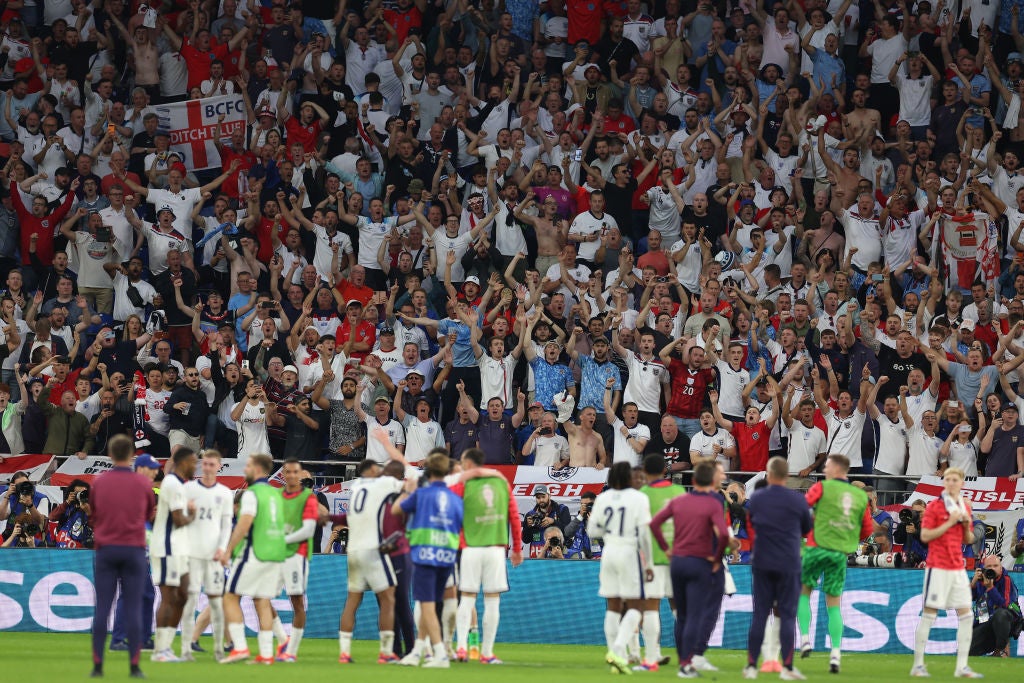Can one overhead kick really change a tournament? Here’s what England think
Jude Bellingham’s 95th-minute bicycle kick saved England from embarrassment in the last 16, as they went on to beat Slovakia in extra time

Your support helps us to tell the story
From reproductive rights to climate change to Big Tech, The Independent is on the ground when the story is developing. Whether it's investigating the financials of Elon Musk's pro-Trump PAC or producing our latest documentary, 'The A Word', which shines a light on the American women fighting for reproductive rights, we know how important it is to parse out the facts from the messaging.
At such a critical moment in US history, we need reporters on the ground. Your donation allows us to keep sending journalists to speak to both sides of the story.
The Independent is trusted by Americans across the entire political spectrum. And unlike many other quality news outlets, we choose not to lock Americans out of our reporting and analysis with paywalls. We believe quality journalism should be available to everyone, paid for by those who can afford it.
Your support makes all the difference.Over the last few days, the England players have felt a “shift” in training. There’s even been a lightness to some of the heavier work. Many of the squad felt the benefit of proper time with the family on Tuesday. Part of that is down to the breathing space that comes from a bit of a break, but most of it is from the release of Jude Bellingham’s goal against Slovakia.
The line all week has been that this is a “turning point”, even coming up repeatedly in team meetings. Gareth Southgate himself set that idea in the euphoria after the Slovakia game, openly talking about how it could be similar to Paul Gascoigne’s goal against Scotland at Euro ‘96. One of his “leadership group”, John Stones, was only too willing to take up the thread.
“I think it is a turning point emotionally, to do it in such a high-pressure moment in the last few minutes,” the centre-half said. “I believe it is going to change a lot of things for the team, going through these emotions.”
It was an undeniably huge goal, but it is still a lot to put on one strike. Can a single moment really change a whole tournament?
There are obvious precedents, from Gascoigne to another frequent reference this week, in David Platt against Belgium in 1990. Even further afield, there was Marco Tardelli’s goal for Italy against Argentina in 1982, Claudio Caniggia for the latter to beat Brazil in 1990, and Zinedine Zidane suddenly turning up the dial against Spain in 2006. The most common example of all, given the context, was Portugal 2016. With each of those teams, single moments saw a conviction suddenly surge through the squads. It can be a powerful thing.

There was still something more to all of the situations, though; maybe even something more to the teams. Both Argentina 1990 and England 1996 had mostly just been flat, requiring a spark. Italy 1982 and France 2006 were low on confidence, which affected coherence. Big wins changed that. With England 1990, it was just the formation, given the quality was visible. Portugal 2016, meanwhile, simply couldn’t get going.
The 2024 England have had all of those problems and worse. It’s not just been flat, but fatigued. It’s not just that the formation doesn’t work, but almost no part of the team does. There are imbalances everywhere. The press has been too cautious, with Southgate’s inherent conservatism ensuring the team don’t commit the extra player required. It has all made England statistically – and very visibly – the slowest team at Euro 2024.
By the same token, the players have persistently said the mood in the camp has been great, indirectly indicating nothing there needs changing… only to go out and play as if the weight of decades is upon them. They were even bickering on the pitch against Slovakia. A previous efficiency under Southgate seemed to have evaporated, clouded by so much second-guessing.

Can one strike, no matter how uplifting, really change all that? This is the duality to late goals, too. On one side, they are an emotional elixir. On the other, the fact they are even required shows fundamental problems in the team. England’s performance against Slovakia was after all just a continuation of what had come before. It was impossible not to watch that game and see where Switzerland could potentially take England apart, especially given what they’d done to Italy just the day before.
That is why Southgate’s own reaction to the victory may be as important as anything. He is finally acting, and doing more than just changing one midfielder. England spent large parts of Wednesday working on a three-man backline. Some around the camp will finally get the approach they want if Southgate sticks with this. Part of this is admittedly because it has been forced on the manager. Marc Guehi’s suspension for a second booking means Southgate doesn’t want to directly expose someone as lacking in tournament experience in Ezri Konsa in that way, but that has also compounded existing thinking.
It has long looked increasingly obvious this is the way to go, and not just because something – anything – needed to change. An emotional lift alone wasn’t going to be enough.

A three-man backline inherently looks like it gives Southgate so many more options with the current squad. Don’t have a midfield? Ensure you don’t have to play through it in the same way, just like 2018. Very few left-footers, and no fit left-back? Just change it to a left wing-back with a licence to attack, so only one such player is needed. Phil Foden and Bellingham both want to play No 10? Put the two of them behind Harry Kane, without the same need to go wide. There are also more potential configurations of midfield, with added protection. Sometimes, a formation can just click, as happened in England in 1990.
It is still a big thing to do mid-tournament. It’s also different to how the formation was used across the 2018 World Cup and Euro 2020, given there are now so many new players.
This will may be that great final challenge for Southgate. Many other teams at this Euros think England have by far the best squad but think he lacks that deeper understanding of fine tactical details. This can be a riposte to such criticism, but it might not need to be.
Even if any formation change only works to a certain degree, that can be enough. England only need to be more competent and compact. If they manage that, Bellingham’s goal can really have effect.

It can strengthen England’s resolve, as well as the belief that they can eventually find a way to win any game. That might not be sustainable over the length of a league season, but this isn’t a league season. It is now just three games for the trophy. England have more than enough match-winners for each of them, and they have now got through the worst of it. That will focus minds. Similarly, while it’s obviously better to have momentum and a working ideology in order to be tournament champions, star-laden teams can flail from game to game and then suddenly they’re in the final.
This might be the extra benefit of a figure like Bellingham, too, who just has this more assertive mentality. It is known that Michael Jordan’s The Last Dance documentary has been watched in the camp, and Bellingham has used conspicuously similar language about weaponising criticism.
There has been a lot of the latter. England have – for now – got past such negativity, to do the bare minimum required. That is another potential change.
It’s all asking a lot, but there’s now not that much left. It’s why single moments can surge into something huge.



Join our commenting forum
Join thought-provoking conversations, follow other Independent readers and see their replies
Comments